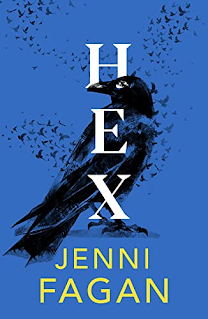December 1591, a prison dungeon in
Edinburgh and in it a young woman – a child, really, only fifteen – called
Geillis Duncan, spending her last hours on Earth before being hanged in the
morning as a witch. Into the darkness of this night comes some light, Iris, a
visitor, she says, from the future. This is the plot of Jenni Fagan’s luminous
novella, Hex, a story about witchcraft and women and the ways of men. We
don’t burn witches any longer, but that doesn’t imply we’re any more civilised.
Not under the skin. In the margins and in the mainstream women are still under
assault and men in power retain their capacity to transgress.
The story of Geillis Duncan is a terrible one, drawn from a dark aspect of Scottish history, the witch trials of the 1590s. Geillis is accused of witchcraft and tortured. In agony, she confesses and also falsely implicates other women and they, too, are drawn into this nightmare of misogyny and violation.
Her visitor, Iris – named after the Goddess of the rainbow who delivered messages to the Gods – is a supernatural traveller from 2021, determined Geillis should not be alone on her final night, and as the two women discuss what must happen in the morning we learn the baleful details of Geillis’s experience, the torture, beatings, rape, being forced to lie and in this way bring the same experience down on other innocent women. This is how terror works, degrading innocence, celebrating cruelty, dragging everyone and everything into its maw.
If this was only a story about Scotland’s legacy of witchcraft it would be bad enough, but Fagan is exploring something much broader here, the roots of that barbarism which have grown and flourished in the dark through five hundred years and still assail our current day experience. Sarah Everard, murdered by a police officer. Nicole Smallman and Bibaa Henry, sisters stabbed to death in a London park and then dehumanised further when their lifeless bodies were photographed by police officers charged with protecting the scene and the photographs were shared for the gratification of other men too senseless to understand human decency.
The sisters’ story, and the stories of other women who have suffered at the hands of men, are woven into Fagan’s narrative, wronged women from our age sharing the stage with the wronged women of 1590s Scotland. For the next ten years, twenty, maybe more, we will remember these stories and remember the women’s names, but in time those names will disappear from the narrative and only the stories will remain, the hurt, the degradation, the sheer, unadulterated cruelty of men’s treatment of women. History become myth. And then we shall need a new Jenni Fagan, five hundred years from now, to give these women back their story.
Iris says at one point: “Men want to know how they got trapped on earth”, but Fagan doesn’t allow them to escape responsibility through this appeal to gnostic suffering. To do so would be to simultaneously acknowledge the spark of the divine in them and it is impossible to reconcile that with what we see men do on a daily basis. “They hold hatred in their heart”, Iris continues. “They want to kill us because we create their lives from our bodies.” But Geillis advises her to show caution:
I would like to say I have no clue what you are talking about, but I do. I also know what heresy and blasphemy sound like, and if they heard what came out of your mouth they’d hang you before they hang me.
Women, then, should not talk back. Should not claim agency. Should not question the order of things. Think of the vigil for Sarah Everard, those women who were accosted and arrested for organising a peaceful moment of reflection in a murdered woman’s memory. Patsy Stevenson – because let’s name another name, let’s not forget, not allow her story to become myth – Patsy Stevenson, a slight woman held down and handcuffed by two uniformed thugs for the crime of compassion.
And now our government, intolerant and hate-filled, stoking fear of “the other”, are changing the laws on freedom of assembly to make it easier for the instruments of the state to turn on the people of the state. Because we can’t have these women gathering and espousing peace, compassion, love, can we? Modern-day witches, all of them, and dangers to the natural order of things.
Burn them.
Hex is a historical novel of
the present day. A wonderful warning. A troubling tale.

No comments:
Post a Comment